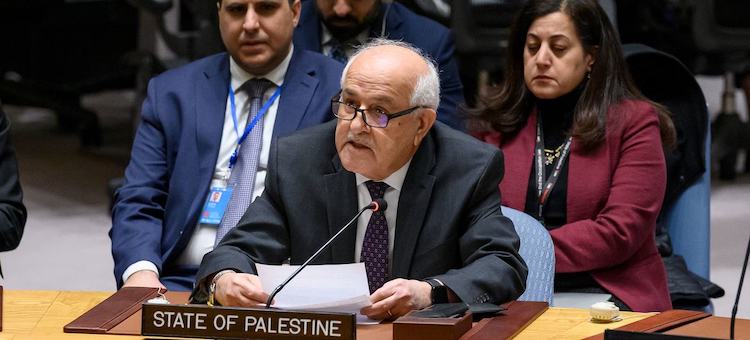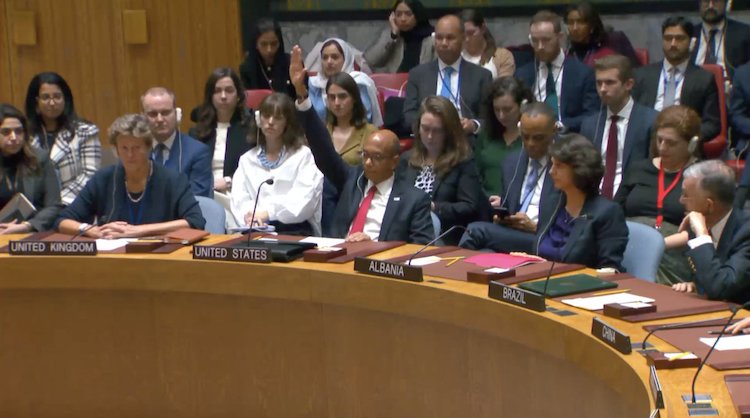By J Nastranis
NEW YORK | 8 December 2023 (IDN) — As intense Israeli bombardment of Gaza and fighting with Palestinian armed groups continued to impede humanitarian aid operations, reports on the ground of children begging for water and people cutting down telephone poles for firewood indicated that “society is about to break down”, the UN agency for Palestine refugees (UNRWA) said.Nevertheless, at an emergency meeting of the UN Security Council on 8 December New York, the US vetoed a resolution calling for “immediate humanitarian ceasefire.” The United Arab Emirates put forward the resolution, which over 90 UN Member States backed. Though 13 voted in favour, and the US vetoed, and United Kingdom abstained.
Secretary-General António Guterres called for the emergency meeting in an urgent letter—one of the most powerful tools at his disposal—on 6 December by urging the body to help end carnage in the war-battered enclave through a lasting humanitarian ceasefire.
Mr. Guterres said, “the UN is totally committed to stay and deliver for the people of Gaza.” The resolution which failed to pass took note of the Secretary-General’s invocation of Article 99, expressed grave concern over the “catastrophic situation” in Gaza, and emphasized that both Palestinian and Israeli civilians must be protected. It demanded an immediate humanitarian ceasefire, and the immediate and unconditional release of hostages as well as humanitarian access.
US: Resolution ‘divorced from reality’
The US engaged in good faith on the text, said Deputy Permanent Representative Robert A. Wood, that would increase opportunities for hostage release and more aid to reach Gaza.
“Unfortunately, nearly all of our recommendations were ignored” leading to an “imbalanced resolution that was divorced from reality that would not move the needle forward on the ground in any concrete way. And so, we regretfully could not support it.”
He said the US still could not understand why the resolution’s authors declined to include language condemning “Hamas’s horrific terrorist attack” on Israel, of 7 October. It killed people from a range of nationalities, subjecting many to “obscene sexual violence.”
He said he had explained earlier in the day why an unconditional ceasefire would simply be “dangerous” and leave Hamas in place, able to attack again. It was “a recipe for disaster for Israel, for Palestinians and for the entire region”.
Any ceasefire leaving Hamas in control would also deny Palestinians the chance to build something better for themselves, he added.
UK: Hamas must be condemned
Explaining the UK’s abstention from the draft resolution, Ambassador Barbara Woodward said her country could not vote in favour of a resolution that fails to condemn the atrocities Hamas committed on innocent Israeli civilians on 7 October.
“Calling for a ceasefire ignores the fact that Hamas has committed acts of terror and is still holding civilians hostage,” she said, noting that Israel needs to be able to address the threat posed by Hamas and it needs to do so in a manner that abides by international humanitarian law.
She reiterated the importance of working meaningfully towards a two-State solution “which delivers statehood for the Palestinians, security for Israel and peace for people on both sides.”
France: ‘No contradiction’ in fighting terror and protecting civilians
France’s Permanent Representative Nicolas de Rivière said the UN chief was correct to raise the alarm over the humanitarian tragedy unfolding in Gaza. “It is for this reason that France voted in favour of this resolution and it is for that reason that we plead for an immediate and lasting humanitarian truce,” he added.
“For our part, we do not see any contradiction in the fight against terrorism and the protection of civilians, in strict respect of international humanitarian law,” he said, adding “we would have wished for this Council to finally have been able to condemn the Hamas attacks and those of other terrorist groups on 7 October.”
“Unfortunately once again, this Council has failed. With a lack of unity and by refusing to genuinely commit to negotiations in doing this, the crisis in Gaza is getting worse and it runs the risk of extending,” he said.
Palestine: ‘Humanity must prevail’

Riyad Mansour, Permanent Observer of the Observer State of Palestine, to the UN outlined the impact of the strikes by Israel, saying the bombardment “placed every possible impediment on humanitarian aid and access.” “And we are all supposed to pretend that this aggression is not aimed at the destruction of the Palestinian people in the Gaza strip, when it has besieged and bombed our people and deprived them of all requirements of life?” he said.
“I keep reading in the media that Israel has no clear war objectives, are we supposed to pretend that we don’t know the objective is the ethnic cleansing of the Gaza Strip?” he continued. He said that if anyone says they are against the destruction and displacement of Palestinian people, they have to be in favour of an immediate ceasefire.
“When you refuse to call for a ceasefire, you are refusing to call for the only thing that can put an end to war crimes, crimes against humanity and genocide. This is how Israel is conducting the war, through atrocities,” Mr. Mansour said.
He noted that the aim of the war by Israel is not security but to “prevent forever any prospect of Palestinian impudence and peace”. “These intentions are clear in the Gaza Strip as well as in the West Bank, including East Jerusalem,” he said. He further underscored the universality of international law, stating that “Israeli exceptionalism has to end, and it has to end now”.
“Stop rewriting international law to fit Israeli crimes and stop calling for respect for international law while supporting an assault that has torn it into shreds,” he said. “The Palestinian people will not die in vain, the Palestinian people deserve respect … we have earned it, we have paid the heaviest price to end it … show us respect, not in words but in deeds, show us respect for our lives and our rights,” he added.
it was “beyond regrettable” and “disastrous” that the Security Council was prevented from upholding its responsibilities—through a newly adopted resolution—in the face of the crisis.
“Millions of Palestinian lives hang in the balance, every single one of them is sacred and worth saving,” he said, adding that instead of allowing this Council to follow its mandate by finally making a clear call, after two months of massacres and atrocities, “the war criminals are given more time to perpetrate their crimes“. “How can this be justified? How can anyone justify the slaughter of an entire people?”, he said.
UNRWA
In a letter to the President of the UN General Assembly Dennis Francis, the head of the UNRWA head, Philippe Lazzarini, warned that the organization’s ability to implement its mandate in Gaza is “severely limited” and that the primary platform for humanitarian assistance to over 2.2 million people in Gaza is “on the verge of collapse”.
“Our staff are still operating health centres, managing shelters, and supporting traumatized people, some arriving carrying their dead children,” he said, but most of them are themselves displaced and lacking food, water and shelter.
So far 130 UNRWA staff have been killed in Gaza since the beginning of the escalation.
WHO
The people of Gaza are being “forced into a horrible scenario”amid a “cruel campaign” by Israel against the population of the Strip in retaliation for Hamas’ terror attacks on 7 October, UN health agency WHO spokesperson Christian Lindmeier told journalists in Geneva on 8 December.
“The situation in Gaza is beyond belief” he stressed, insisting that the enclave “cannot afford to lose”one more ambulance or hospital. WHO has documented 212 attacks on healthcare in the Strip since 7 October affecting 56 facilities and 59 ambulances.
The health workers in Gaza don’t have food or water, patients are bleeding on hospital floors and trauma wards resemble battlefields, Mr. Lindmeier said.
Usually “in any refugee camp situation” there would be a minimum of seven liters of water per day per person, he stressed, while in Gaza that number is currently between one and two liters. WHO convoys have repeatedly been stopped on the road while trying to bring medical supplies, with desperate people “trying to force food and water out of them”.
The WHO spokesperson also revealed that on 8 December a convoy of medical supplies destined for Al-Ahli hospital in the north, which was also aiming to evacuate 12 patients to the south, had to be suspended due to the security situation.
Mr. Lindmeier added that a special session of the WHO Executive Board would take place on Sunday to discuss health conditions in the occupied Palestinian territory, following a request from 15 of its 34 members. A draft decision which will be discussed at the meeting, he said.
OCHA
Humanitarians continued carrying limited aid distributions in the south of the Strip while continuing to stress that “nowhere is safe”. On 7 December, such limited aid distributions took place in Rafah governorate, UN humanitarian affairs coordination office OCHA said.
OCHA notes that in the adjacent Khan Younis governorate, except for the above-mentioned medical supplies delivery, “aid distribution largely stopped due to the intensity of hostilities”.
The UN Office also stressed that as tens of thousands of additional displaced people are being pushed further south and squeezed into compressed spaces, their survival is “hanging by a thread”. OCHA head and UN emergency relief chief Martin Griffiths warned that due to the pace of the Israeli military assault in the south of the enclave “we do not have a humanitarian operation in southern Gaza that can be called by that name anymore”.
OCHA reported that the influx of internally displaced persons to Rafah has continued and that there was “no empty space left for people to shelter, not even in the streets and other open areas”. Thousands of people lacking basic essentials waited for hours around aid distribution centres and “there are concerns of a breakdown in law and order under these conditions,” OCHA said. [IDN-InDepthNews]
Photo: US Deputy Permanent Representative Robert A. Wood vetoes Security Council draft resolution that would have demanded an immediate humanitarian ceasefire in Gaza, and immediate and unconditional release of all hostages. Credit: @UN_News_Centre
IDN is the flagship agency of the Non-profit International Press Syndicate.


